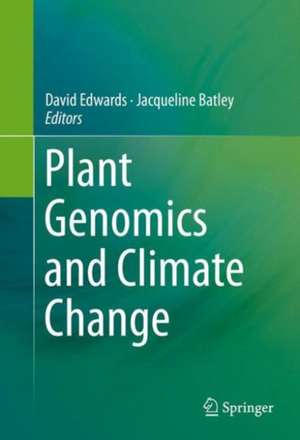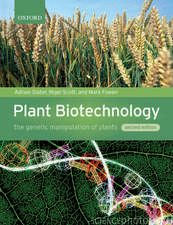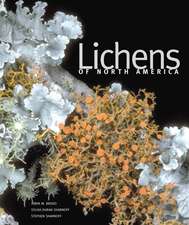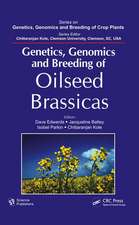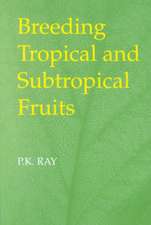Plant Genomics and Climate Change
Editat de David Edwards, Jacqueline Batleyen Limba Engleză Hardback – 29 mar 2016
This book explores the impact of climate change on agriculture and our future ability to produce the crops which are the foundation of the human diet. Specifically, individual chapters explore the potential for genomics assisted breeding of improved crops with greater yield and tolerance to the stresses associated with predicted climate change scenarios. Given the clear and unmet challenge to mitigate climate changing events, this book will be of wide interest from plant breeders and environmental scientists, government bodies through to a more general audience who are interested in the likely impact of climate change on agriculture.
| Toate formatele și edițiile | Preț | Express |
|---|---|---|
| Paperback (1) | 552.75 lei 38-44 zile | |
| Springer – 19 apr 2018 | 552.75 lei 38-44 zile | |
| Hardback (1) | 568.74 lei 38-44 zile | |
| Springer – 29 mar 2016 | 568.74 lei 38-44 zile |
Preț: 568.74 lei
Preț vechi: 710.93 lei
-20% Nou
Puncte Express: 853
Preț estimativ în valută:
108.84€ • 118.19$ • 91.43£
108.84€ • 118.19$ • 91.43£
Carte tipărită la comandă
Livrare economică 19-25 aprilie
Preluare comenzi: 021 569.72.76
Specificații
ISBN-13: 9781493935345
ISBN-10: 1493935348
Pagini: 205
Ilustrații: XII, 200 p. 27 illus., 13 illus. in color.
Dimensiuni: 155 x 235 x 15 mm
Greutate: 0.55 kg
Ediția:1st ed. 2016
Editura: Springer
Colecția Springer
Locul publicării:New York, NY, United States
ISBN-10: 1493935348
Pagini: 205
Ilustrații: XII, 200 p. 27 illus., 13 illus. in color.
Dimensiuni: 155 x 235 x 15 mm
Greutate: 0.55 kg
Ediția:1st ed. 2016
Editura: Springer
Colecția Springer
Locul publicării:New York, NY, United States
Public țintă
ResearchCuprins
The Impact of Climate Change on Agricultural Crops.- The Impacts of Extreme Climatic Events on Wild Plant Populations.- Control of Arable Crop Pathogens; Climate Change Mitigation, Impacts and Adaptation.- Transcriptomics and Genetics Associated with Plant Responses to Elevated Co2 Atmospheric Concentrations.- Genomics of Drought.- Genomics of Temperature Stress.- Genes, meet Gases: The Role of Plant Nutrition and Genomics in Addressing Greenhouse Gas Emissions.- The Impact of Genomics Technology on Adapting Plants to Climate Change.- Genomics of Salinity.
Notă biografică
Prof David Edwards gained an Honours degree in Agricultural Science from the University of Nottingham and a PhD from the Department of Plant Sciences, University of Cambridge. He has held positions within academia (University of Adelaide and University of Queensland, Australia; University of Cambridge, UK; and McGill University, Canada), government (Long Ashton Research Centre, UK, Department of Primary Industries, Victoria, Australia) and industry (ICI seeds, UK). David was appointed as a Centenary Professor at The University of Western Australia in 2015. His research interests include the structure and expression of plant genomes, the discovery and application of genome variation and applied bioinformatics, with a focus on crop plants and accelerating crop improvement in the face of climate change.
Prof Jacqueline Batley is an ARC Future Fellow at the University of Western Australia. She was awarded her PhD from the University of Bristolin 2001 and moved to Australia in 2002. Jacqueline has expertise in the fi elds of plant and animal molecular biology, genetics and genomics, gained from working in both industry and academia. Her areas of interest include genetic and genomic analysis for applications including genetic diversity, linkage disequilibrium and comparative genomic studies, working across environmental and agricultural areas. Her current research projects include the molecular characterisation of agronomic traits, with a focus on disease resistance in Brassicas, with studies in both the fungal pathogen and the host plant.
Textul de pe ultima copertă
This book explores the impact of climate change on agriculture and our future ability to produce the crops which are the foundation of the human diet. The sustainability of agriculture is being challenged by climate change and rising food demand from a larger and wealthier human population. Humanity faces a global food deficit unless the efficiency and resilience of crop production is improved.
This work addresses the specific climate change issues and explore the potential for genomics assisted breeding of improved crops with greater yield and tolerance to the stresses associated with predicted climate change scenarios. Within the coming decades challenges to international food production will occur like no other time in human history, and a substantial increase in the production of food is essential if we are to continue to feed the growing human population. There is an urgent need to increase crop yield, quality and stability of production, enhancing the resilience of crops to climate variability and increasing the productivity of minor crops to diversify food production.
Improvements in agricultural practice and the increased use of fertilisers and pesticides have increased food production over the last few decades, however it is now considered that further such improvements are limited. The science of genomics offers the greatest potential for crop improvement.
Through the application of genomics technology it is possible to accelerate the breeding of major crops, bring current orphan crops into accelerated agricultural breeding programs and convert diverse non-crop species into future crops adapted to the changing climate. Through this process we can help secure the food supply for the coming generations.
Caracteristici
Explores the potential of genomics for agriculture in the face of climate change Compiles research from internationally known leaders in the field of molecular breeding Provides analysis on a wide range of climate change predictions and future scenarios Includes supplementary material: sn.pub/extras
